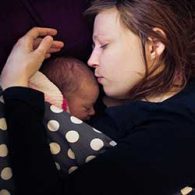Will Night Nursing Cause Anemia?
Question: I still co-sleep with my 2-year-old daughter and nurse throughout the night. She is in the 25 percentile in weight and her pediatrician told me that what I am doing is very wrong and that I should have night weaned her a year ago. My doctor said that her low weight and poor appetite are due to night nursing and if I continue she might become anemic. The doctor did a hemoglobin test on her and it was normal. My heart tells me the doctor is wrong. I offer her healthy food throughout the day and eats until she is full or not interested anymore.
Things to Consider When Night Nursing a Toddler:
1. “Mommy Brain” and Intuition
The key to your question is: “My heart tells me the doctor is wrong.” Your “heart” is really your “mommy brain,” the GPS (an extra intuitive center) that grew in your brain as you grew your baby in your womb. Listen to it and trust it.
While it would be unwise for me to second guess your trusted doctor, in my experience working in Bill’s pediatric office and in my lactation-consulting practice, breastfeeding babies who “sleep through the night” are more likely to have a weight-gain problem than do frequent night nursers. Perhaps the 25th percentile is her ideal weight, especially if her height is normal according to her body type.
2. Track Bowel Movements
Another key to consider is the number and type of daily bowel movements. Babies who have inadequate weight gain due to inadequate nutrition tend to have fewer and harder bowel movements, such as instead of at least one or two a day they usually have one every three or four days.
3. Updated Recommendation
It may also be comforting to you to know that by continuing to breastfeed your two-year-old daughter you are doing what nutrition experts around the world, including the World Health Organization (WHO), recommend – breastfeeding your baby for at least two years. The recommendation that “I should have night weaned her a year ago…” is not up to date with what science now says about the body- and brain-health benefits of extended breastfeeding.
4. Provide More Nutrient Dense Foods
In reading your question, my first impression was you’re doing all the right things and your toddler may not have a nutritional problem. Yet, since I can’t see your daughter, let’s trust your pediatrician’s advice that perhaps she could use extra nutrition. Try offering her strictly nutrient-dense foods during the day – those foods that pack the most nutrition in the smallest volume – such as avocado, an egg, salmon, nutbutters, olive oil; full-fat plain, organic yogurt; and cheese.
Try a nibble tray (described on our website, AskDrSears.com). Sit next to your toddler and let her pick nutritious nibbles from her tray throughout the day. You may be delighted to see how she uses her thumb and forefinger like little chopsticks and just picks from morning till night until the tray is empty, and her tummy is full.
I also applaud you for offering her healthy foods throughout the day and watching that she eats until she is full. That’s what babies need to learn to do – eat until they’re satisfied – no more, no less.
5. Serum Ferritin Level
It’s also noteworthy that your baby’s hemoglobin is normal. Many babies who truly do have a nutritional deficiency are often anemic as your doctor was concerned about. If your doctor in the future is still concerned about “anemia,” request a serum ferritin level, as this is a much more accurate blood test for anemia than is only a hemoglobin. The downside is it requires a blood draw at a laboratory rather than a simple hemoglobin finger stick test in the doctor’s office.
Final Thoughts About Night Nursing
I won’t comment on her “nursing throughout the night” since I’m assuming you’re okay with this. If toddler and mommy are okay, continue this beautiful relationship, as years down the road you will look back on this short period of time and realize you made a wise life-long investment into your daughter’s mental and physical health.
Written By: Martha Sears, RN
Martha is the mother of Dr. Bill’s eight children, a registered nurse, a former childbirth educator, a La Leche League leader, and a lactation consultant. Martha is the co-author of 25 parenting books and is a popular lecturer and media guest drawing on her 18 years of breastfeeding experience with her eight children (including Stephen with Down Syndrome and Lauren, her adopted daughter). Martha speaks frequently at national parenting conferences and is noted for her advice on how to handle the most common problems facing today’s mothers with their changing lifestyles. Martha is able to connect with both full-time, stay-at-home mothers and working mothers because she herself has experienced both styles of parenting. Martha takes great pride in referring to herself as a “professional mother” and one of her favorite quips when someone voices their concern about her having eight children in an already populated world is: “The world needs my children.”

